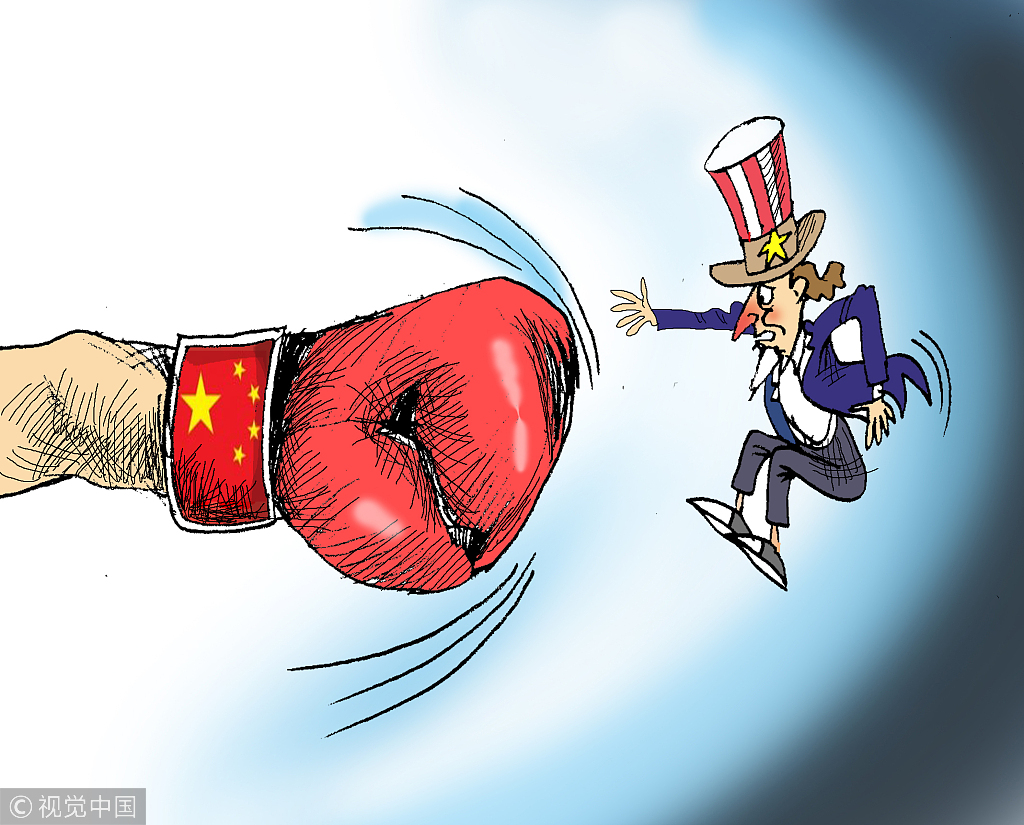US jobs, economy to be hurt by trade war


US experts have voiced deep concerns over the administration of US President Donald Trump's trade war against China, a war that they say violates WTO rules and will hurt US jobs and the nation's economy.
Trump fired the first shot on Friday by imposing punitive tariffs on $34 billion in imports from China. China quickly retaliated by levying tariffs on the same amount.
Gary Hufbauer, a nonresident senior fellow at the Peterson Institute for International Economics and deputy assistant secretary for international trade and investment policy at the US Treasury from 1977 to 1979, said "'bully' is the correct description" of what Trump has been doing to China, Canada, Mexico and other US trade partners.
Before levying tariffs on China, the Trump administration had imposed new tariffs on steel and aluminum in the name of national security, triggering retaliation from US trade partners as well as their complaints filed with the World Trade Organization. On Friday, China also lodged a WTO complaint against the latest US tariffs.
"Unfortunately, at the moment there is no effective domestic backlash to the destruction that Trump is wreaking on the international economic order," said Hufbauer, adding that most people in the US and many lawmakers are not familiar with WTO rules.
Trump has repeatedly accused the WTO of treating the US unfairly and has reportedly threatened to withdraw from the international trade body.
Wayne Morrison, a trade and finance specialist at the Congressional Research Service, said there is great concern among US trade experts that Trump's unilateral action will undermine the global trading system that the US helped build.
Henry Levine, a senior adviser at the Albright Stonebridge Group and a former deputy assistant secretary of commerce for Asia in the administration of former US president George W. Bush, said Trump's decision to go forward with tariffs on Chinese goods reflects two of his deeply held beliefs: that trade is a zero-sum game and that other countries have been taking advantage of the US for decades with their trade surplus.
"You can see these two perspectives not only in the tariffs imposed on Chinese goods, but also in tariffs imposed on products from US friends and allies," he said.
Economists and trade experts have disagreed with Trump's interpretation of the cause and benefit of the trade imbalance. They believe that the US trade deficit is caused primarily by its fiscal policy, the low saving rate and the role of the US dollar as a global reserve currency.
"Trump is ignoring the pleas of the business community. He seems to be betting that his get-tough approach against China will make his political base happy, even though these policies will hurt many of them in the long run," Morrison said.
"A trade war would be very costly to both economies and the global economy as a whole," he added.
A study led by Mary Lovely at the Peterson Institute showed Trump's latest tariffs on China will hit non-Chinese supply chains even harder. Many of Chinese exports to the US come from foreign companies operating in China.
Edward Alden, a senior fellow at the Council on Foreign Relations, said the only way for the Trump administration to change course is as a result of domestic political pressure.
"My hope is that then there will be a period of reflection in which all the countries involved will find a way to come back to the negotiating table," he said.
"I still believe there is time to prevent this trade war from further escalation, but we are in a dangerous period," Alden said.
On Friday, the Office of the US Trade Representative announced guidance for companies on how to apply for exclusion from the newly imposed tariffs on products made in China. Companies will have 90 days to file the requests.
"The real intention of the Trump administration is to deter China while minimizing the negative impact on its electorate," said Mei Xinyu, a researcher with the International Trade and Economic Cooperation Institute of the Ministry of Commerce.
"In fact, even if a certain number of US companies obtained exclusions from the additional tariffs, it would not relieve the pressure on its overall economy. High costs imposed on Chinese goods would eventually be passed on to US consumers," said Li Yong, deputy director of China Association of International Trade Expert Committee.
Contact the writers at chenweihua@ chinadaily.com.cn































